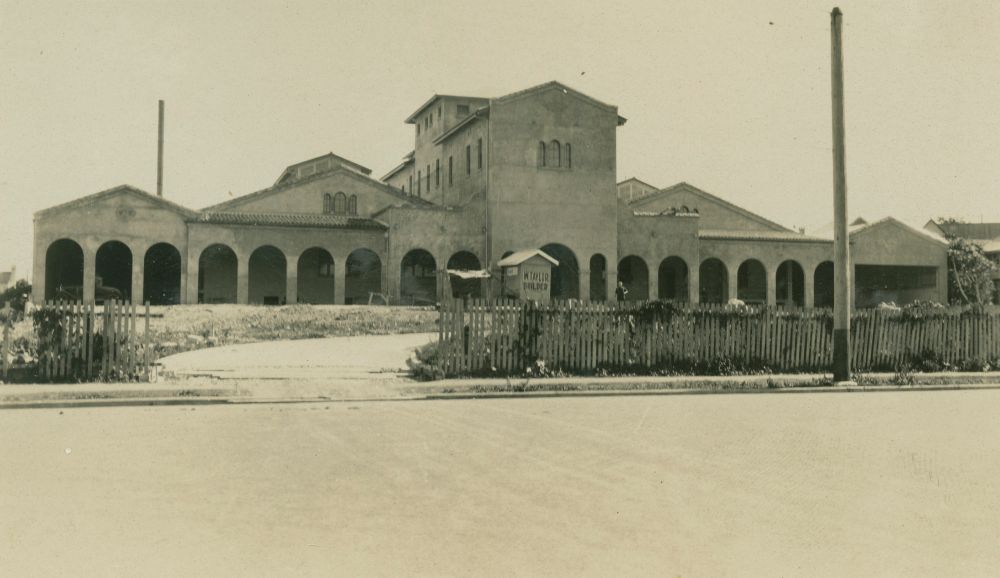Addresses
Type of place
Factory
Period
Interwar 1919-1939
Style
Spanish Mission
Addresses
Type of place
Factory
Period
Interwar 1919-1939
Style
Spanish Mission
Designed by prominent Brisbane architectural firm Atkinson, Powell and Conrad, this unusual Spanish Mission styled factory building was constructed in 1930 for soft drink manufacturer Thomas Tristram. The building remained in use by Tristrams until 1979 and has since been converted into a market.
Also known as
West End Markets
Lot plan
Key dates
Local Heritage Place Since —
Date of Citation —
Construction
Roof: Terracotta tile;Walls: Masonry - Render
People/associations
Atkinson, Powell and Conrad (Architect);Thomas Tristram (Occupant)
Criterion for listing
(A) Historical; (B) Rarity; (E) Aesthetic; (H) Historical association; (H) Historical associationInteractive mapping
Also known as
West End Markets
Lot plan
Key dates
Local Heritage Place Since —
Date of Citation —
Construction
Roof: Terracotta tile;Walls: Masonry - Render
People/associations
Atkinson, Powell and Conrad (Architect);Thomas Tristram (Occupant)
Criterion for listing
(A) Historical; (B) Rarity; (E) Aesthetic; (H) Historical association; (H) Historical associationInteractive mapping
History
This unusual Spanish Mission style factory was constructed in 1930 for Tristrams Ltd., aerated water and cordial manufacturers. The business itself was established in 1875 by Thomas Tristram. Tristram arrived in Brisbane in 1864 and worked for Gardner and Keid, aerated water and cordial manufacturers, for ten years. In 1875 he started his own business, and in 1877 in partnership with Owen Gardiner, opened a factory in Hope Street, South Brisbane.
After managing the business for almost nine years Tristram again branched out on his own, taking over the Hope Street factory as a sole owner. He was forced to move, however when the Council resumed his property for "road improvements" in the mid- 1920s. Tristram found an ideal new location for his factory when his former partner Owen Gardiner decided to move from his two acre Boundary Street site to a new factory in the Valley.
The Tristram family purchased the Boundary Street land in July 1929. By January the following year, Tristram had commissioned distinguished architects Atkinson, Powell and Conrad to design a "new and up to date" factory. In 1928, Peter Ice Cream Ltd. had completed its modern brick factory on the adjacent site, establishing this as a new industrial precinct.
The Architectural and Building Journal in January 1930 reported that Tristram' new factory was to be ".... Thoroughly modern in every respect, with a well laid out garden and lawns occupying the front of the site". In March, the same journal announced that the well-known builder Walter Taylor of Graceville had secured the contract for this work. The cost of the new brick building with concrete floors was estimated at £25,000.
The completed factory was held up as an exemplary industrial building of the late 1920s. It demonstrated new attitudes towards industrial architecture and the growing trend towards landscaping industrial buildings.
The building was considerably altered, especially its interior, when Tristrams sold the factory in 1979, over a century after the company's foundation. The building was converted into a shopping complex, with all the machinery removed; air conditioning installed and lowered ceilings installed above the new shops.
Description
The West End Markets (formerly Tristrams factory) are designed in Spanish Mission style with an arched colonnade, rendered masonry construction and mock terracotta tiles. The central section of the building is two storeys but it extends to four storeys plus a basement in parts. This is flanked by two large gable roofed spaces with clerestories, and beside these, another two long gable roofed access ways. The predominant roofing material is corrugated fibre cement with the mock terracotta tiles occurring only at the gable ends and above the colonnade. In each gable end is a group of three small arches with two narrow ones flanking a wider central arch. A moulded diamond motif occurs on the gable of the central two storey portion. The colonnade steps up to the two storey centre piece and its arches incorporate decorative iron grilles bearing the letter 'T'. The arches that once filled the end bays have been removed to allow vehicular access. The once lawned forecourt is currently in use as a car park for the markets. At the rear its new commercial function has necessitated some additions.
Statement of significance
Relevant assessment criteria
This is a place of local heritage significance and meets one or more of the local heritage criteria under the Heritage planning scheme policy of the Brisbane City Plan 2014. It is significant because:
References
-
W.F. Morrison, The Aldine History of Queensland, page 267
-
Titles Office Records
-
The Brisbane Courier, 24 September 1923, page 16
-
Ibid, March 1930, page 13
-
RAJA, Buildings of Queensland, Brisbane: Jacaranda Press, 1959, page 48
Citation prepared by — Brisbane City Council (page revised January 2022)
